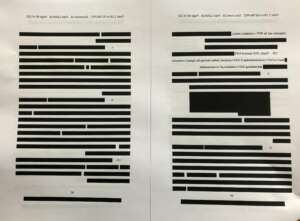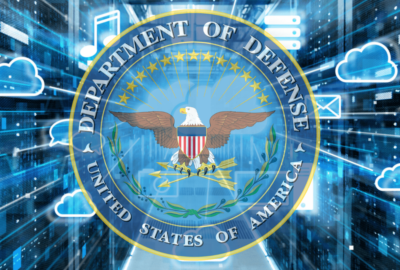
Government accuses Amazon of violating transparency rules in its JEDI lawsuit
Justice Department lawyers accuse Amazon of improperly redacting a "large quantity" of information from the publicly-released version of its JEDI lawsuit
Readers of the publicly-released edition of Amazon Web Services’ lawsuit challenging the Pentagon’s JEDI Cloud contract may have felt AWS was a bit aggressive in choosing the passages it blacked out. Apparently the Justice Department thinks so too.
On Tuesday, attorneys for DOJ and Defense Department filed an unusual objection with the Court of Federal Claims, saying a “large quantity” of Amazon’s redactions were unjustified and ran afoul of court rules that demand a presumption of public access to judicial records. They also accused AWS of trying to create an “information imbalance” in what the public knows about the case.
“The public version of the complaint redacts material that does not qualify for protection under the court’s protective order, under the law, or under the rules of this court,” they wrote. “As such, the United States respectfully requests that the court reject AWS’ overbroad redactions and direct that AWS refile a redacted version of its complaint redacting only material properly warranting protection.”

The government’s new filing pointed to judicial precedents that dictate court records in bid protest cases can generally only be redacted to protect the competitive process, and not just “to withhold information that a party frowns on making public.” It said the information that the company held back from the public version went far beyond what’s required by the relatively-boilerplate protective order Judge Patricia E. Campbell-Smith issued in the JEDI case.
And according to the objection, AWS attorneys were selective — in ways that served Amazon’s interests — about what they chose to redact. DOJ alleges, for instance, that AWS obscured details about how DoD evaluated its own JEDI proposal, but left intact the same sort of information about how the department graded Microsoft.
“Absent a compelling demonstration of the potential for competitive harm, AWS should not be permitted to use the protective order to create an information imbalance in the public record that could itself negatively impact the competitive process in the event of renewed competition for this or other procurements in the future,” the government told the court.
According to the objection, government and AWS attorneys had been in negotiations about what should be redacted from the public version of the complaint. But no agreement had been reached by Monday, and Amazon elected to add a version to the public docket that reflected its own preferred deletions.
It included entire pages of blacked-out text. In one of the most unusual examples, AWS chose to redact the URL and part of the content and headline of a publicly-available news article it had cited in its complaint. That FCW story was about Amazon’s existing cloud contract with the CIA.
One passage in the government’s new filing may explain that decision: Amazon has apparently taken the position that it’s required to make redactions from the JEDI lawsuit because of “restrictions pursuant to another contract.” DOJ, however, is skeptical of that claim, and AWS’ relationship with the CIA has long been public knowledge.
The new filing takes particular exception to Amazon’s decision to remove information about how DoD evaluated Microsoft and AWS’ respective bids. Not only did it redact details about the prices each company proposed, it also blacked out portions of text and charts that would have revealed how the department rated particular aspects of their proposals. Those types of details are typically made public in bid protest cases.
“The large quantity of information that AWS redacts on the basis that it reveals the agency’s evaluation ratings of AWS’ or Microsoft’s proposals, or the relative merits of aspects of those proposals, is not justified,” according to the objection. “Although AWS is well-positioned to identify its own proprietary information, the government is the party best positioned to identify information, particularly source selection information, that must be protected to safeguard the competitive process. Our review has determined that the redacted information to which we object in our proposed redacted version does not need to be protected to safeguard the competitive process.”
AWS started its formal challenge of the multibillion dollar award on Nov. 14, and the litigation is expected to drag on for several more months. Recent entries on the court’s electronic docket appear to indicate the company is girding for a significant legal battle.
So far, it has asked the court for permission for 20 separate attorneys to gain access to the unrestricted records it expects to litigate over the course of the JEDI lawsuit. By contrast, Microsoft has submitted applications for just three lawyers. Amazon’s legal team includes Ted Olson, the former U.S. solicitor general who is perhaps most famous for representing President George W. Bush before the Supreme Court in Bush v. Gore, and Ted Boutrous, a high-profile media law and crisis management attorney.
Related Stories
Ellen Lord, the undersecretary of Defense for acquisition and sustainment, told reporters on Tuesday that the department had scheduled a kickoff meeting with Microsoft for Wednesday to begin planning the initial stages of the work the company will do.
And in an interview over the weekend with Defense News, Pentagon Chief Information Officer Dana Deasy said DoD expects at least the unclassified portions of JEDI to be up and running by as soon as February. After long delays caused, in part, by two other JEDI bid protests, the department is ready to get to work, he said.
“From the beginning, the way we constructed the teams and organized how to write the RFP to where we are today, there was such deep consideration and due diligence – making sure we followed all the regulations,” Deasy told the publication. “I’ve told the team, ‘let’s just not sit and wait. Let’s start to get the environment ready so when we come out of the protest, we haven’t lost any momentum.’”
Copyright © 2024 Federal News Network. All rights reserved. This website is not intended for users located within the European Economic Area.
Jared Serbu is deputy editor of Federal News Network and reports on the Defense Department’s contracting, legislative, workforce and IT issues.
Follow @jserbuWFED







